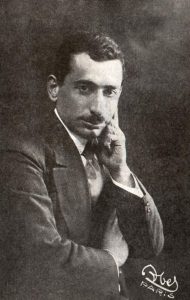Home » Publications » Books
Category Archives: Books
“Killing Order”: Talaat Pasha’s Telegrams and the Armenian Genocide–A Lecture by Professor Taner Akçam

By Brendan W. Clark ’21
Editor; History Major
Taner Akçam is a Professor of History and the Robert Aram, Marianne Kaloosdian, and Stephen and Marian Mugar Chair in Armenian Genocide Studies at Clark University. He was one of the earliest Turkish academics to acknowledge the Ottoman commission of the genocide.
The Armenian Club of Trinity and the History Department welcomed Professor Taner Akçam, Professor of History and the Robert Aram, Marianne Kaloosdian, and Stephen and Marian Mugar Chair in Armenian Genocide Studies at Clark University to Trinity on Monday, March 19th. Professor Akçam spoke on his newest book, Killing Orders: Talat Pasha’s Telegrams and the Armenian Genocide. He discussed the significance of the telegrams and their role in affirming the Ottoman governments involvement in many of the events underscoring the Ottoman Empire’s perpetration of the Armenian Genocide.
Akçam began by addressing the continuing denials of the Turkish government, who deny the occurrence of the Armenian Genocide itself. This argument, argued Akçam, rests on the supposition that there was never an official decision by Ottoman authorities to exterminate Armenians. To augment their claims, Akçam cited the two strategies pursued by the deniers: that they have consistently hidden or destroyed the bulk of documentary evidence and that they continue to deny the existence of certain available documents.
New Book on the African Diaspora by Prof. Euraque
Professor Dario A. Euraque, History Department Chair and Professor of History and International Studies, published his fifth book in Spanish this past August. He co-authored the book with Honduran historian Yesenia Martínez, former Director of the Historical Research Division of the Honduran Institute of Anthropology and History, and former Director of the Honduran Center for Research and Documentation at the National Archive of Honduras.
The book is titled La Diáspora Africana en los Programas Educativos de Centroamérica (Tegucigalpa: Editorial Guaymuras, 2013); in English, The African Diaspora in Educational Programs in Central America.
The photo on the book’s cover is by Professor Pablo Delano, of Trinity College’s Studio Arts Program. Trinity International Studies and English major Carolina Galdiz ’14 is currently translating the Spanish edition into English thanks to a Trinity College Faculty Research Completion Grant. The book features several additional photos from Professor Delano’s collection, which he took during his last trip to Honduras in April of 2009.
During the last ten years, the historiography of Central America has registered new contributions to the study of colonialism and the presence and ethnohistory of Africans and people of African descent in this region of the Americas. This has been especially the case in Costa Rica and Panama, followed by Honduras, Nicaragua, Guatemala, and lastly El Salvador.
Some of the most interesting studies have articulated their arguments and problematics with questions and debates associated with the literature on the African Diaspora in the Americas, in general, and with the older traditions of studying slavery in the region, including comparative perspectives with the United States.
LECTURE: Beirut – The Port That Became an Educational Capital
By Duncan Grimm ’15
Thursday, February 14, at the Smith House, Trinity alumna Betty Anderson ’87, Associate Professor of History at Boston University delivered a well-attended lecture on Beirut, Lebanon’s capital city. Presented by the History Department, the International Studies Program, and the Co-Curricular Initiative on Cities, Anderson described how a minor city on the Mediterranean shore became a major trading hub and hotbed of learning throughout the latter half of the nineteenth, and majority of the twentieth centuries, reinvigorated recently in the decades following the Lebanese Civil War.
Today, Beirut is Lebanon’s largest port, responsible for much of the goods that pass in and out of the country. The role of education in this extraordinary urban growth is not lost on Professor Anderson, and is addressed in her 2011 book The American University of Beirut: Arab Nationalism and Liberal Education. Initially seeking to uncover how students of AUB became politicized, Anderson soon discovered that the story of the University lay in Protestant missionary tradition and international intrigue between European nations and the Ottoman Empire.
Mussolini’s Battle For The Roman Past: The Ancient Redesigned

By Duncan F. Grimm (History major, class of 2015)
Welcome to Rome, the Eternal City of many layers and rich history. Despite ages of construction and destruction the city today appears ingeniously planned. A lesser known, or discouraged fact, is that Mussolini and his vision for Rome created this city we experience today. On Thursday, November 1, Professor Borden W. Painter, Jr. (Trinity College ’58) enlightened an audience at the Center for Urban and Global Studies of Mussolini’s Rome, and how the self-proclaimed Marshal of Empire changed the city’s urban landscape. In the 1920s and 1930s his dream of creating a new Imperial Rome completely redesigned the city that we enjoy today. “Mussolini fought many battles,” Painter said, and “he identified chiefly with Augustus.” From 1922 to 1943 Italy was a fascist state; understandably, immediately after the Second World War there was an immediate backlash against all things fascist. In the 1970s and 1980s however, individuals began to adopt a more eclectic view of Il Duce’s Rome–it may be possible to have some good come out of a bad regime.
(more…)
“Faculty Highlights”: New book by Professor Zayde Antrim
 Routes and Realms: The Power of Place in the Early Islamic World (2012, Oxford University Press) examines early texts produced by Muslims during the ninth through eleventh centuries, paying specific attention to how the authors conveyed attachment to the lands in which they lived. This attachment created what Antrim describes as “widely resonant categories of belonging. “Representing plots of land as homes, cities, and regions in texts…was a powerful way to claim loyalty, authority, and belonging in the early Islamic world,” said Antrim, who teaches courses on Islamic civilizations, Middle Eastern history, nationalism, and geography. “I have always been interested in geography and the ways in which the geographical imagination shapes the way we see and act in the world.””
Routes and Realms: The Power of Place in the Early Islamic World (2012, Oxford University Press) examines early texts produced by Muslims during the ninth through eleventh centuries, paying specific attention to how the authors conveyed attachment to the lands in which they lived. This attachment created what Antrim describes as “widely resonant categories of belonging. “Representing plots of land as homes, cities, and regions in texts…was a powerful way to claim loyalty, authority, and belonging in the early Islamic world,” said Antrim, who teaches courses on Islamic civilizations, Middle Eastern history, nationalism, and geography. “I have always been interested in geography and the ways in which the geographical imagination shapes the way we see and act in the world.””
Read entire article HERE.
History Faculty featured in The Trinity Reporter (Summer 2012)
Brianna Diaz of the Trinity Reporter (Spring/Summer 2012) published a feature on 6 faculty members of History Department to discuss writing history. She writes: “In 2012, four faculty members from Trinity’s History Department expect to publish new books. Additionally, two books published by history faculty during the past few years continue to be met with critical acclaim and translated into new languages. The Reporter asked each of these faculty members to comment on their books.” Read entire feature HERE.
(more…)


